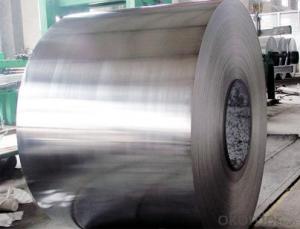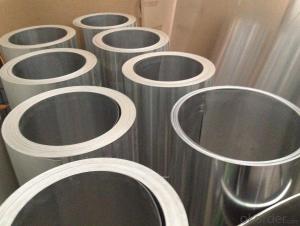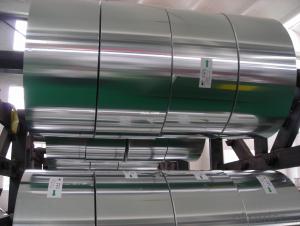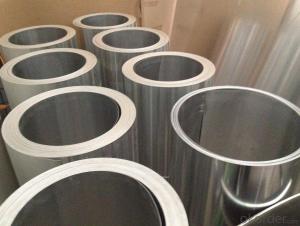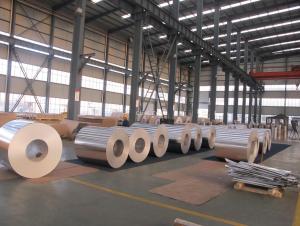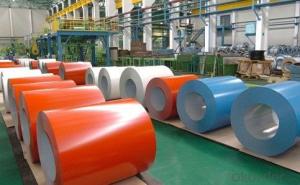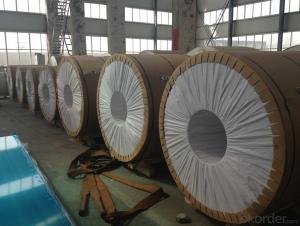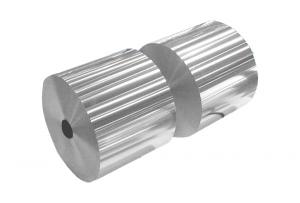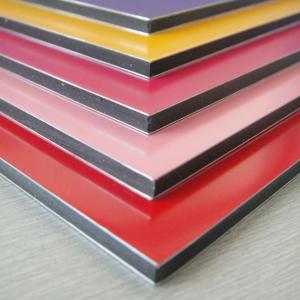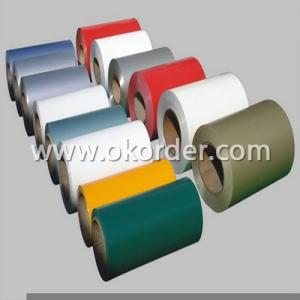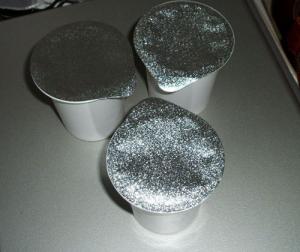Aluminum Prepainted Aluminum Coil for Making Curtain Wall in China
- Loading Port:
- Shanghai
- Payment Terms:
- TT OR LC
- Min Order Qty:
- 5 m.t.
- Supply Capability:
- 100000 m.t./month
OKorder Service Pledge
OKorder Financial Service
You Might Also Like
Specification
Product Description
Commodity: Aluminum coil jumbo rolls
Alloy: 1050/1060/1100/1200/3003/3004/3005/3105/5005/5052/5754/5083/6061/8011
Temper: O, H12,H14,H16,H18,H22,H24,H32,H112,T6
Gauge: 0.2mm-8mm
CC and DC material with higher tensile strength and bigger elongation
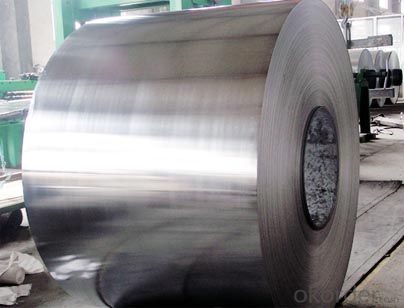
product description
Alloy: 1000 series, 3000 series, 8000series
Temper: O H22 H24 H26 H28
Apply: bill board, selectronic circuit board, building exterior decoration, curtain wall plate,reflective devices,ect.
Thickness:0.2-2.0mm
Length: 1000-6000mm
Width:1100-1700mm
Place of Origin: Shandong China (Mainland)
Brand Name: pilot
| Alloy No. | Thickness (mm) | Width (mm) | Length (mm) | Temper | |
| 1100, 1050, 3003, 8011 | 0.2-2.0 | 1100-1700 | 1000-6000 | O,H22, H24,H26,H28 | |
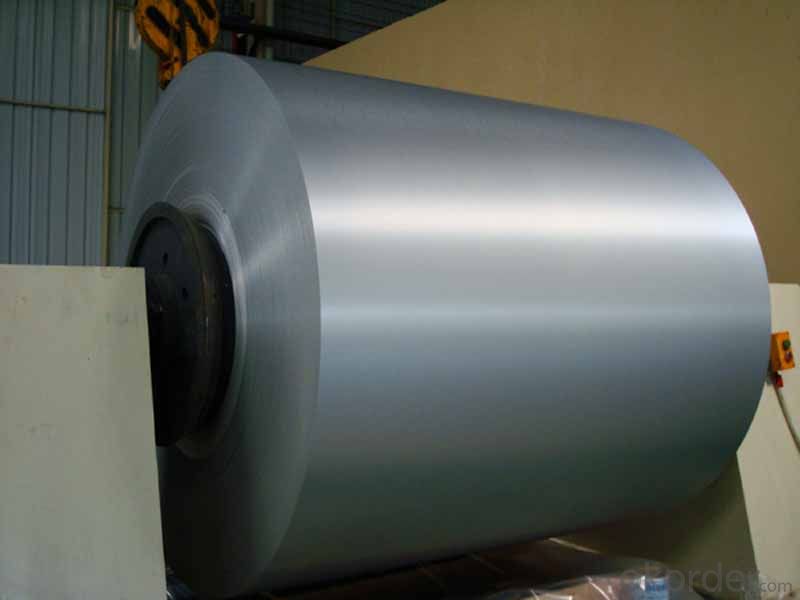
Our Services
CNBM is ready to assist with any product needs or enquiries. We value our customers and welcome your thoughts and feedback.
Please send comments, questions and requests through alibaba or our personal contact so they can be directed to the appropriate department.
About samples: Based on our company rules, a few samples are willing to be offered, but clients are requested to pay freight.
Working time:9:00~17:30(GM+8) from Monday to Friday, but you also can contact with us via personal contact information during our leisure time. We will try our best to offer you service in 24*7 hours.
Any quality, quantity problems are occured, response you will get in time not over more 24 hours after we recieve your complains. Problems will be solved in one week throught friendly negotiation.
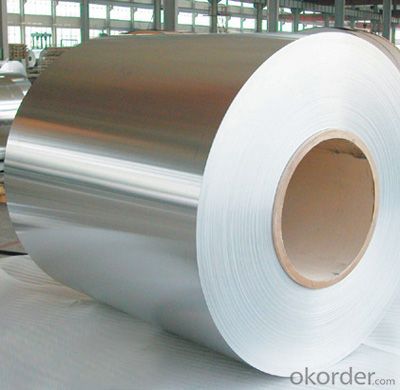
FAQ
Q: Can you provide free samples?
A: Yes, free samples will be sent to you on freight at destination.
Q: Can I get your latest catalogue?
A: Yes, it will be sent to you in no time.
Q: What is the MOQ?
A: 5 tons
Q: What are your payment terms?
A: We accept L/C, D/A, D/P, T/T, West Union,etc.
If you are interested in our products, please do not hesitate to contact with us via following information
- Q: This question asks about the various uses of aluminum alloys within the construction industry.
- <p>Aluminum alloys are widely used in construction due to their strength, light weight, and corrosion resistance. Some applications include: 1) Structural framing for buildings and bridges, leveraging their high strength-to-weight ratio. 2) Window and door frames, benefiting from their durability and low maintenance. 3) Roofing materials, as they are lightweight and resistant to weathering. 4) Facade cladding, for aesthetic appeal and resistance to environmental damage. 5) Electrical wiring and conduits, due to their excellent electrical conductivity and safety. 6) Scaffolding, as they are lightweight and easy to assemble. 7) Solar panel frames, taking advantage of their lightweight and recyclable properties. These applications highlight aluminum alloys' versatility and importance in modern construction.</p>
- Q: Explain the environmental impact of using aluminum in construction materials.
- <p>Aluminum used in building materials has both positive and negative environmental impacts. On the positive side, aluminum is lightweight, durable, and highly recyclable, which reduces waste and conserves resources. It also has good thermal conductivity, which can improve energy efficiency in buildings. However, the production of aluminum is energy-intensive and generates greenhouse gases, contributing to climate change. Additionally, the mining and processing of bauxite, the primary source of aluminum, can lead to habitat destruction and water pollution. Despite these issues, the recyclability of aluminum means that its environmental footprint can be significantly reduced through proper recycling practices.</p>
- Q: Is it possible to utilize aluminum in the manufacturing of components for aerospace applications?
- <p>Yes, aluminum is widely used in the aerospace industry for making various components due to its high strength-to-weight ratio, corrosion resistance, and ease of fabrication. It is commonly used in aircraft structures, wings, fuselage, and engines. Aluminum alloys are preferred for their excellent fatigue resistance and ability to withstand high temperatures and stresses encountered in flight.</p>
- Q: This question asks about the potential dangers associated with exposure to aluminum through consumption of food and drinking water.
- <p>Aluminum exposure in food and water can pose several health risks. Chronic exposure may lead to cognitive dysfunction and Alzheimer's disease, although this link is still debated. It can also cause bone disease by leaching calcium, potentially leading to osteomalacia and osteoporosis. In the nervous system, aluminum can cause neurotoxicity, leading to symptoms like memory loss and impaired learning. Additionally, aluminum may accumulate in the brain, potentially contributing to neurodegenerative conditions. It's important to note that the extent of these risks can vary based on individual susceptibility and the level of exposure.</p>
- Q: Is it safe and effective to use aluminum foil for wrapping food items in a freezer?
- <p>Yes, you can use aluminum foil to wrap food in the freezer. Aluminum foil is a good insulator and can help protect food from freezer burn. It also prevents cross-contamination and keeps odors from affecting other foods. Ensure the foil is tightly wrapped around the food to maintain freshness and quality. However, for long-term storage, it's recommended to use airtight containers or freezer-safe plastic bags in addition to or instead of foil, as they can provide better protection against freezer burn and moisture loss.</p>
- Q: This question asks about the process of manufacturing aluminum foil.
- <p>Aluminum foil is made through a process that begins with the extraction of aluminum from its ore, bauxite. The bauxite is first refined to produce aluminum oxide, which is then reduced to aluminum metal using the Hall-H茅roult process. The aluminum is then melted and cast into large ingots. These ingots are heated and rolled into thin sheets in a series of passes through large rolling mills. As the metal cools, it hardens, and the thickness of the sheet is progressively reduced. The final thin sheets are then cut and packaged as aluminum foil. This process requires precision and control to achieve the desired thickness and quality of the foil.</p>
- Q: This question asks about the impact of aluminum on the aging process in living organisms.
- <p>Aluminum's effect on the aging process is a subject of ongoing research and debate. Some studies suggest that aluminum can accumulate in the body over time, potentially contributing to age-related diseases such as Alzheimer's. It is hypothesized that aluminum may interfere with cellular function, disrupt enzyme activity, and cause oxidative stress, which are all factors associated with aging. However, the exact mechanisms and the extent of aluminum's role in aging are not fully understood. It's important to note that the human body naturally has mechanisms to excrete aluminum, and the contribution of aluminum to aging is not conclusively proven. More research is needed to establish a clear link between aluminum exposure and the aging process.</p>
- Q: What are the primary applications and benefits of aluminum in various industrial sectors?
- <p>Aluminum is extensively used in the industry due to its lightweight, high strength, and excellent corrosion resistance. It is a key material in the aerospace industry for aircraft construction to reduce weight and improve fuel efficiency. In the automotive sector, aluminum is used for engine parts and body panels to enhance fuel economy and performance. The construction industry utilizes aluminum for window frames, roofing, and structural components due to its durability and low maintenance. Aluminum is also prevalent in the packaging industry for food and beverage cans, and in electrical applications for wiring and transformers due to its high conductivity. Its recyclability makes it an environmentally friendly choice, further enhancing its industrial applications.</p>
- Q: What are some safety measures that should be taken into account when working with aluminum?
- <p>When working with aluminum, it's important to follow several safety precautions. Always wear appropriate personal protective equipment (PPE) such as gloves, safety glasses, and a dust mask to protect against aluminum dust. Ensure proper ventilation to avoid inhaling aluminum dust or fumes. Use spark-resistant tools when cutting or welding aluminum to minimize the risk of fire. Keep a fire extinguisher nearby and be aware of the flammability of aluminum. Store aluminum in a dry, cool place to prevent it from reacting with moisture. Lastly, be cautious when handling aluminum alloys, as some can be more reactive or hazardous than pure aluminum.</p>
- Q: This question asks about the various applications and purposes of aluminum in different industries and everyday life.
- <p>Aluminum is widely used due to its lightweight, corrosion resistance, and high thermal and electrical conductivity. It's extensively used in the transportation industry for manufacturing vehicles, airplanes, and ships. In construction, it's used for window frames, roofing, and structural components. Aluminum is also prevalent in packaging, particularly for food and beverages, and in electrical components like wiring and capacitors. Additionally, it's used in everyday items such as cans, foil, and cookware, and in industrial machinery and tools. Its versatility and recyclability make it a valuable material across many sectors.</p>
Send your message to us
Aluminum Prepainted Aluminum Coil for Making Curtain Wall in China
- Loading Port:
- Shanghai
- Payment Terms:
- TT OR LC
- Min Order Qty:
- 5 m.t.
- Supply Capability:
- 100000 m.t./month
OKorder Service Pledge
OKorder Financial Service
Similar products
Hot products
Hot Searches
Related keywords
